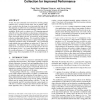319 search results - page 11 / 64 » Age-Based Garbage Collection |
104
click to vote
ICFP
2002
ACM
16 years 2 months ago
2002
ACM
Generational collection has improved the efficiency of garbage collection in fast-allocating programs by focusing on collecting young garbage, but has done little to reduce the co...
OOPSLA
2007
Springer
15 years 8 months ago
2007
Springer
To date, the most commonly used criterion for invoking garbage collection (GC) is based on heap usage; that is garbage collection is invoked when the heap or an area inside the he...
179
click to vote
GPC
2010
Springer
15 years 6 months ago
2010
Springer
Abstract. Large-scale distributed computing applications require concurrent programming models that support modular and compositional software development. The actor model supports...
121
click to vote
IWMM
1992
Springer
15 years 6 months ago
1992
Springer
Abstract. Automatic storage management is important in highly parallel programming environments where large numbers of objects and processes are being constantly created and discar...
129
click to vote
FOSSACS
2001
Springer
15 years 6 months ago
2001
Springer
Garbage collection relieves the programmer of the burden of managing dynamically allocated memory, by providing an automatic way to reclaim unneeded storage. This eliminates or les...

